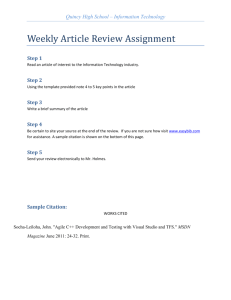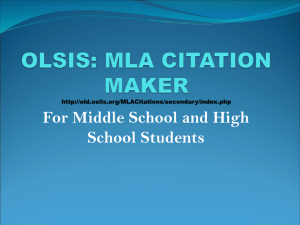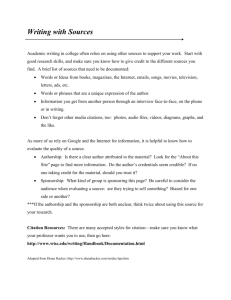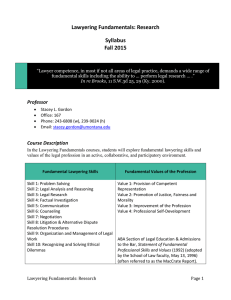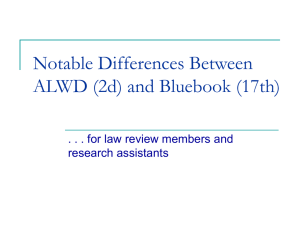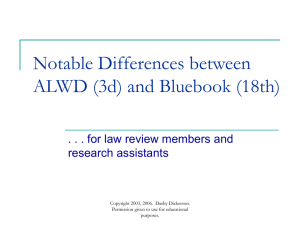TR2_IntroCM2
advertisement
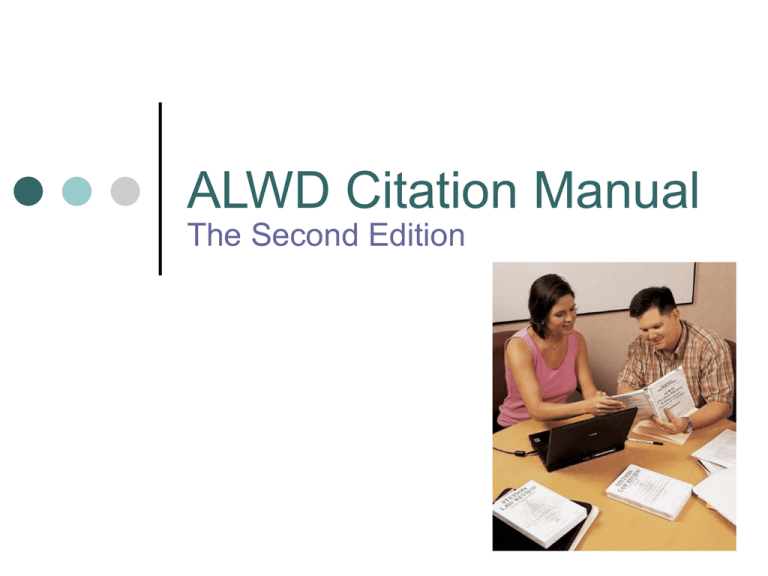
ALWD Citation Manual The Second Edition Philosophy Not change for the sake of change Clarifications Additions Responding to user questions and comments Returning Features Fast formats Sidebars Diagramed examples More examples Detailed index Local court rules Two-color design Web site for updates Notable Changes So. 2d – Southern Reporter “Accord” and “see also” new signals Specific rules on capitalization and numbers added New rules on citing jury instructions and ethics opinions Conform to new conventions for citing Internet sources New appendix on tax materials Updated examples Expanded index Rule 1: Typeface Underlining spaces Comma after histories not italicized Possessive endings Italics within italics Emphasis Foreign words Rule 2: Abbreviations Can now abbreviate &, Assn., Bros., Co., Corp., Inc., Ltd., and No. in text. Rule 3: Capitalization Hyphenated terms Titles Organization names Proper nouns Adjectives formed from proper nouns Events and holidays Numerical designations Midword capitalization Defined terms Specific words (NOTE: Court) Rule 4: Numbers Numbers in text (0-99, plus round numbers) Beginning a sentence Series and proximity Decimals, ratio, and time Numbers and symbols Fractions Commas Ordinals Rules 5 and 6 Rule 5: Passim Rule 6: Et seq. No major changes to Rules 7 through 10. Rule 11: Short Citations 11.2(b)(2): Use a short citation when (a) the reader will not be confused about which source is being referenced and (b) the reader will not have trouble locating the full citation quickly. Thus, in a short legal document, you may need only one full citation for a particular source and then may use short citations in each instance thereafter. In longer legal documents, you may need a full citation each time you start a new section. Rule 12 – Cases New information on foreign party names Anonymous/initials Abbreviating common words Shortening names List of business designations expanded “The” in party name Information on new Federal Appendix reporter Rule 14: Statutes New rule on electronic statutes U.S.C. date – 2000 LEXIS L. Publg. now LEXIS New rule on historical notes Short citation options expanded Short Citations for Statutes Full citation (United States Code): Short citation options: 42 U.S.C. § 12101 (2000). 42 U.S.C. § 12101. § 12101. Id. at § 12102. Full citation (named statute): Short citation options: Administrative Procedure Act § 5(d), 5 U.S.C. § 554(e) (2000). Administrative Procedure Act § 5(d). § 5(d). 5 U.S.C. § 554(e). Id. at § 5(a). Rule 17: Rules No date needed for current versions of rules: Fed. R. Civ. P. 11. Ethics opinions rule added Jury instructions rule added Rules 22 and 23: Books and Periodicals Expanded language on subtitles and spacing after a colon Rule 27: Restatements, Model Rules, etc. ABA model rules now located here Sentencing Guidelines rule added Rule 40: World Wide Web No angle brackets Citizens for a Better Envt., Environmental Update ¶ 3, http://www.environ.better.org/update/ 1999/html (last updated Mar. 15, 1999). May designate subsections May use page numbers in .pdf documents Rule 40: URLs Keystroke identifiers can be used Lib. Cong., THOMAS, Broadsides from the Continental Congress and the Constitutional Convention, http://thomas.loc.gov/; select Historical Documents (last updated Feb. 1, 2001). Break points: after slash; before period Dates: rule has hierarchy; may include a specific time Sidebar on reliability Short citation formats expanded Rule 43 Old Rule 43 on neutral formats has been deleted. So, everything that followed is now renumbered. Rule 44: Signals Accord: Use to show that two or more authorities state or support the proposition but the text quotes or refers to only one; the others are then preceded by “accord.” Also use to show that the law of one jurisdiction is in accord with that of another jurisdiction. See also: Use to cite additional material that support the proposition. Support under this signal is not as strong or direct as when no signal or “see” is used. “See also” may be used when the cited authority supports the point made, but is in some respect distinguishable from previously cited cases. Rule 46: Parentheticals Example on using parentheticals to reflect synthesis added Related authority rule added quoting quoted in cited in reviewing Appendices 1: Updated; exact format given for intermediate appellate courts; more federal courts added 2: Updated 3: Many more words added 4: Very few changes 5: Some new journals added 6: Very few changes 7: (New) Tax materials 8: (Web only): administrative materials (was numbered 7 in first edition) Result? Very few differences from the Bluebook in terms of rules. But, ALWD is more user friendly. The last edition of the Bluebook actually used some ALWD features and shifted to some ALWD rules. Major difference continues to be one citation system versus two in the Bluebook. Significant Adoptions University of Texas University of Michigan Northwestern University Emory Boston University University of California – Hastings United States District Court for the District of Montana Bryan Garner’s Redbook on legal style Final Issues and Thoughts There will be a separate international/foreign edition Speed Cite has been updated The CALI lesson on ALWD has been updated Questions/Discussion
